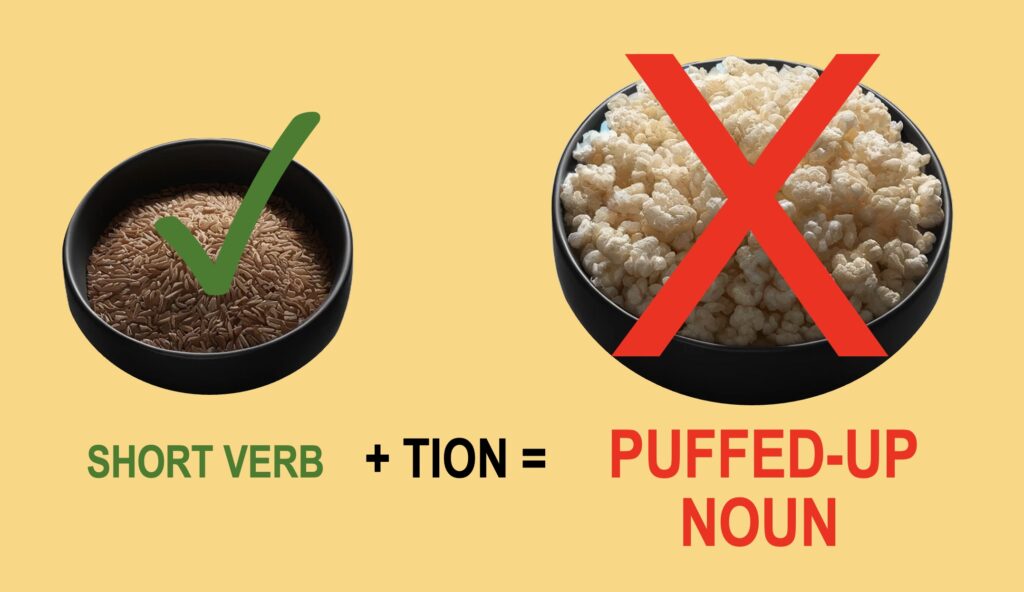Search results for: quick tips
Quick tip: Shun the TIONs!
2.5 minute read. 3.5 minute listen. I see them all across the nation, to my total consternation: puffed-up words that end in TION. Too many people play this game of word puffery. You just add TION to any verb, and “poof!” it turns into a noun. But in my book, that’s going in the wrong…
Read MoreQuick tip: Here’s how to handle LSD
No, this isn’t advice on avoiding bad trips. This is about writing numbers clearly, using the notion of the Least Significant Digit (LSD). 3 minute read. Y minute listen. One of my pet peeves is false precision: numbers that suggest more accuracy than they can possibly convey. For example, say you drive to a…
Read MoreQuick tip: 3 steps to a stronger title [with example]
The title is the single most important line in your white paper. A good title gets your paper noticed. A poor title gets it ignored. That’s why much of the success of a white paper depends on your title. But many writers struggle with titles. So here’s a step-by-step process that makes writing your title…
Read MoreQuick tip: Don’t say “once every xx seconds…”
I’ve been researching suicide lately. Don’t worry; I’m not thinking about doing myself in. It’s for a fictional story I’m working on. In my research, I encountered a statistic that always bugs me. Here it is, from no less than the World Health Organization: Suicide: one person dies every 40 seconds1 What a shocker, right?…
Read MoreQuick tip: Here’s a great little book on statistics
So far, I’ve posted two quick tips on how to avoid shoddy statistics. Both articles included examples from the real world. You can see those here: Don’t use numbers out of context Don’t say “once every xx seconds…” So how about some positive tips on how to use numbers properly? If you’re interested in how…
Read MoreQuick tip: Understand the audience for your white paper
Comedians know it. Politicians know it. And white paper writers must know it, too. The first key to success is to understand your audience. “Understanding your audience will help you write the content they need in the words and the way they need it,” says industry veteran Ginny Redish in her excellent book, Letting Go…
Read MoreQuick tip: To find the gem, wash away the muck
One problem I often see in white papers is over-long quotes from sources. Lengthy quotes can easily slow down your narrative and distract from the point you’re trying to make. If you see a quote that runs two or three paragraphs long, you can be pretty sure the writer included too much. Your goal as…
Read MoreQuick tip: 6 easy hacks for ChatGPT [with sample prompts]
After using ChatGPT for a time, we all tend to learn a few hacks that give better results. So here’s a quick roundup of six easy ways to pump up your prompts. The first three are commonplace tips you may have heard before. The last three are strange “emotional engineering” tips to push the AI…
Read MoreQuick tip: Don’t use numbers out of context
White papers need solid proof to make their case. So please don’t fabricate shoddy statistics out of thin air. If you try to make up a snappy-sounding statistic, you’re taking a huge risk. You’re gambling that: You can get away with deceiving prospects No one will question your sources or analysis No one will say…
Read MoreQuick tip: Don’t start your white paper like this
Too many white papers suffer from what I call “throat-clearing.” That’s when a paper begins by repeating something the audience already knows. Consider this example from a white paper from HP: Rapid innovations in Internet and mobile computing technology are drawing many communications, media, and entertainment (ME) companies to expand into profitable new markets to…
Read More








